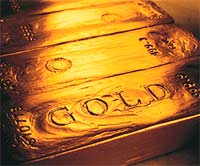|
| Help | |
| You are here: Rediff Home » India » Get Ahead » Money » Invest |
|
To answer that question, let's first take a look at what people, especially our countrymen, have been doing. Gold consumption in India during the second quarter of 2005 is 47% higher than demand during the same quarter last year. Small wonder that India is the world's largest gold buyer. The bulk of the demand for gold is from jewellers. Traditionally, Indians have always bought gold for weddings and festivals. But the number of individuals buying gold as an investment is on the rise. It's not only Indians who are buying gold - people all over the world are. Right now, the price of gold in the international market is over $470 an ounce (1 ounce = 28.35 gms). This is an 18-year high! Since the current rupee value of the dollar is Rs 43.98, that translates into Rs 20,670 an ounce. With the price of gold so high, it makes sense to buy gold only if it will go up further in the future. What the experts are saying? Here is what some of the professional analysts from investment firms say: JP Morgan gold analysts believe that gold prices will remain high in the long-term. The reason: supply not keeping pace with demand. You know the first lesson in economics; if demand is greater than supply, then the price of the product increases. This is especially true of a scarce commodity like gold. According to analysts, demand is bound to increase from an emerging Chinese jewellery market while South African gold production has declined and a limited supply is being generated from new mines. Citigroup analysts too are of the stand that gold prices will continue to rise. They say that higher Indian and Chinese demand, coupled with buying by Middle Eastern investors flush with money from the oil boom, will continue to raise gold prices. They also feel it will cross $500 an ounce soon. There are three major sources of gold. The bulk of it comes from gold mines. The other sources are recycled gold and the gold reserves maintained by central banks all over the world. Others bullish on gold point out that gold is still well below the $700 an ounce seen in 1980. The lure of gold It's true that gold has been a hedge against risk. At the first sign of a crisis, investors flock to gold. When there is a lot of uncertainty, people tend to buy gold. In case of war or terrorism, gold is safe. No matter what happens, gold is still an international currency. The massive current account deficit in the US is the US is also cause for concern. This will lead to interest rates rising in the American economy which slows down consumer spending and hence demand for goods will drop. If demand drops, then supply too will be curtailed and it may lead to the global economy slowing down. So if you are expecting the stock markets and property markets to crash, then you might as well look at gold for stability. Inflation too is a concern. With the growth in China and India putting pressure on raw material prices, prices of goods could rise. The steep rise in crude oil prices is also cause for concern. When the crude oil prices rise, it causes the prices of all goods to increase. This results in inflation and the world begins to panic. Not to mention fears about the next terrorist attack. So what should you do? Here are some points you need to keep in mind: Gold is traditionally a safe haven for investors, who buy gold whenever there is economic uncertainty. Second, speculators have also been active in pushing up the price of gold. In the longer-term, economic growth in China and India will drive demand for gold jewellery. If you are buying it purely from an investment point of view, then buy gold bars and not jewellery. When you sell gold bars, you get the current gold rate. When you sell jewellery, you end up with less and also pay more for working costs when buying. Disclaimer: While efforts have been made to ensure the accuracy of the information provided in the content, rediff.com or the author shall not be held responsible for any loss caused to any person whatsoever who accesses or uses or is supplied with the content (consisting of articles and information). | |||||||||||||||||||||||||||||||||||||||||||||||||
|
|
|
| © 2008 Rediff.com India Limited. All Rights Reserved. Disclaimer | Feedback |
 Well, they've been buying gold, and large quantities of it. In the second quarter of this year, India bought a huge 277 tonnes of gold, which was, guess what, 30% of total demand for gold globally during the period.
Well, they've been buying gold, and large quantities of it. In the second quarter of this year, India bought a huge 277 tonnes of gold, which was, guess what, 30% of total demand for gold globally during the period.